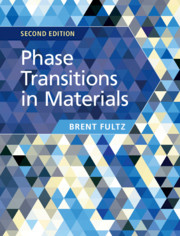Book contents
- Frontmatter
- Contents
- Preface
- Notation
- Part I Basic Thermodynamics and Kinetics of Phase Transformations
- Part II The Atomic Origins of Thermodynamics and Kinetics
- Part III Types of Phase Transformations
- 11 Thermodynamics and Phase Transitions at Surfaces
- 12 Melting
- 13 Solidification
- 14 Phase Transformations with Interfaces: 1. Microstructure
- 15 Phase Transformations with Interfaces: 2. Energetics and Kinetics
- 16 Spinodal Decomposition
- 17 Phase Field Theory
- 18 Method of Concentration Waves and Chemical Ordering
- 19 Diffusionless Transformations
- 20 Thermodynamics of Nanomaterials
- 21 Magnetic and Electronic Phase Transitions
- Further Reading
- References
- Index
17 - Phase Field Theory
from Part III - Types of Phase Transformations
Published online by Cambridge University Press: 24 April 2020
- Frontmatter
- Contents
- Preface
- Notation
- Part I Basic Thermodynamics and Kinetics of Phase Transformations
- Part II The Atomic Origins of Thermodynamics and Kinetics
- Part III Types of Phase Transformations
- 11 Thermodynamics and Phase Transitions at Surfaces
- 12 Melting
- 13 Solidification
- 14 Phase Transformations with Interfaces: 1. Microstructure
- 15 Phase Transformations with Interfaces: 2. Energetics and Kinetics
- 16 Spinodal Decomposition
- 17 Phase Field Theory
- 18 Method of Concentration Waves and Chemical Ordering
- 19 Diffusionless Transformations
- 20 Thermodynamics of Nanomaterials
- 21 Magnetic and Electronic Phase Transitions
- Further Reading
- References
- Index
Summary
Phase field theory treats the phases in materials as fields inside a material, as opposed to tracking the motions of interfaces during phase transformations. The interface sharpness is determined by a balance between bulk free energies and the square gradients of the fields. Treating phases as fields has advantages for the computational materials science of microstructural evolution, and some kinetic mechanisms are described. The different equations for the evolution of a conserved order parameter (e.g., composition) and a nonconserved order parameter (e.g., spin orientation) are discussed. The structure of an interface, especially its width, is analyzed for the typical case of an antiphase domain boundary. The Ginzburg–Landau equation is presented, and the effects of curvature on interface stability are discussed. Some aspects of the dynamics of domain growth are described.
Keywords
- Type
- Chapter
- Information
- Phase Transitions in Materials , pp. 441 - 457Publisher: Cambridge University PressPrint publication year: 2020



